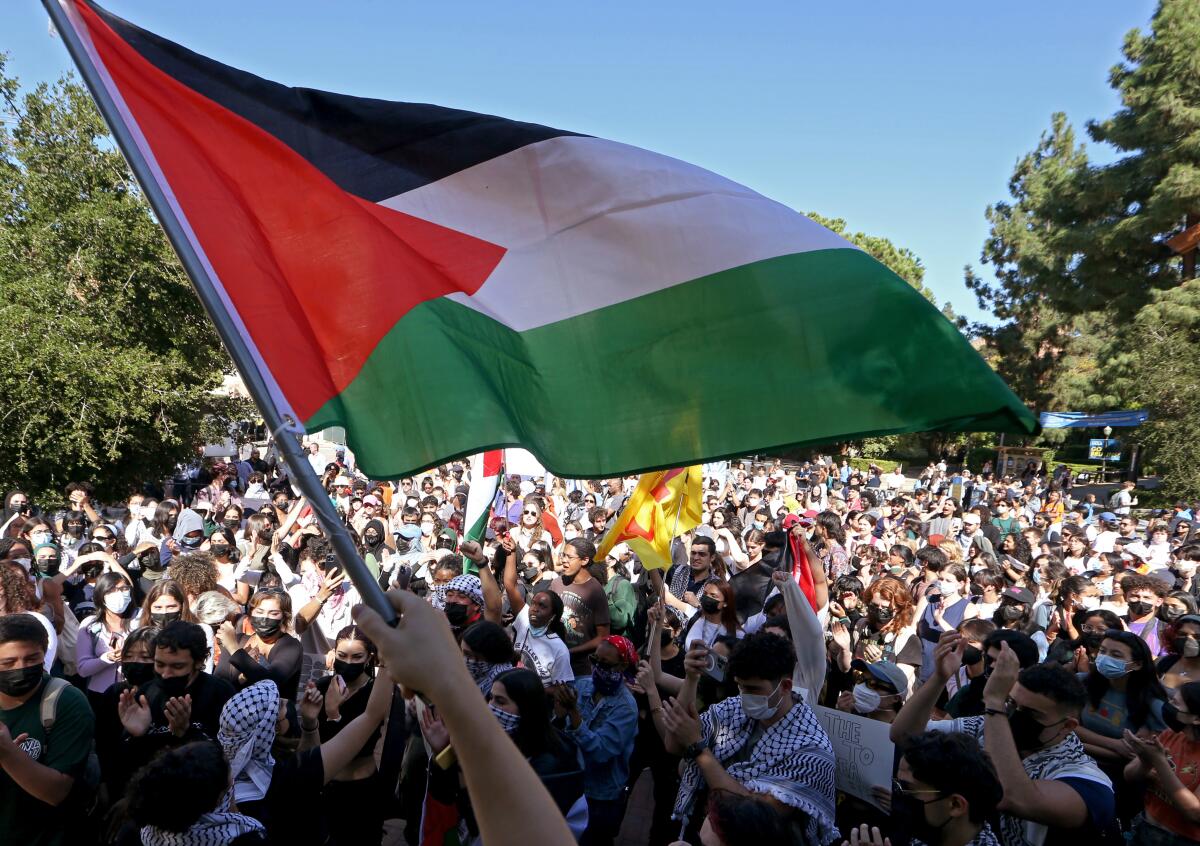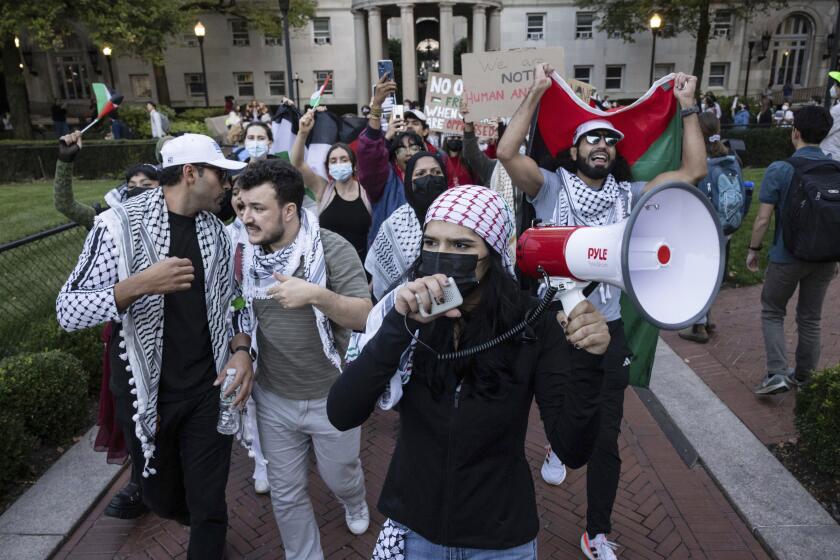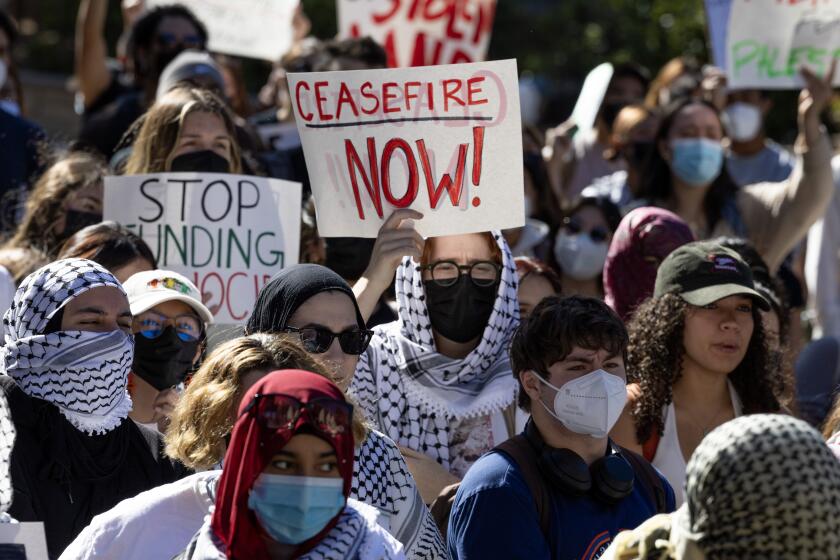Pro-Palestinian UC students feel they are not supported. Some on the faculty are organizing to change that

- Share via
University of California faculty members across the system have launched an unprecedented organizing effort to defend campus advocates for Palestinian rights who feel unsupported after reporting widespread harassment and threats triggered by the Israel-Hamas war.
The effort to form Faculty for Justice in Palestine groups is part of a national movement that has taken off at nine of the 10 UC campuses, along with Princeton, New York University and Rutgers, among others. Faculty organizers said they were propelled to act by what many described as a singularly dangerous time for academic freedom and free speech, with the lives, careers and safety of campus Palestinian supporters on the line.
“I feel we’re at an inflection point,” said Ananya Roy, a UCLA professor of urban studies, social welfare and geography who is helping lead efforts at her campus to form a Faculty for Justice in Palestine group. “Folks are so alarmed by the calls for repression that we suddenly are seeing a real sense of urgency to have these formations in place.”
The organizing effort comes as Israel supporters said Jewish students on campuses across the nation have been subjected to hostile rhetoric against them and have experienced acts of escalating antisemitism. Many Israel supporters criticize the Students for Justice in Palestine campus group for what they regard as threatening actions. The student organization was recently suspended until the end of fall term by Columbia University for violating school policy leading to an “unauthorized event” that included “threatening rhetoric and intimidation,” according to a campus statement.
Yet faculty organizers say Palestinian supporters — whose large numbers on campuses nationwide are fueling robust activism — need the help to counterbalance better funded and organized pro-Israel campus groups that provide safe spaces. They say longstanding organizations, such as Hillel, and Israel studies centers, can swiftly mobilize to support Jewish students, along with a network of outside Israel defense groups that closely monitor perceived acts of antisemitism and move to combat them.
The result, argued Saree Makdisi, a UCLA English professor, is stronger blowback against pro-Palestinian students and faculty members — losing jobs or getting doxxed on such online blacklists as Canary Mission — than their pro-Israel peers.
At UCLA, junior faculty members have reported being criticized by senior members for including Palestinian voices in their course materials. One student said she burst into tears after feeling shut down in a class for defending Palestinian rights. An “emergency teach-in” on the crisis in the Gaza Strip led by Makdisi and other Palestinian supporters was moved online due to safety concerns. But students who gathered in a campus hallway to watch said they were verbally assaulted by young men who accosted them, screamed that they were terrorists and threw their laptops in a trash can. And a UCLA professor drew widespread criticism over reports that she required students to attend the teach-in — rumors that turned out to be false, according to a campus statement.
Makdisi and others say they hope that collective organizing — especially by faculty members with the privileges and protection of tenure — will strengthen their ability to protect vulnerable students and colleagues, expand teaching about the conflict and demand equal treatment for their concerns from campus leaders. Already, their voices have ramped up intense back-and-forth debate on campus and amplified their demands to the university administration.
The Palestinian cause — and hostility toward Israel — has shifted from the sidelines of student activism to a robust political movement at U.S. colleges.
Judea Pearl, a UCLA computer science professor who has led pro-Israel activism on campus, said he “of course” had no objection to the faculty forming support groups for Palestinian supporters. He said pro-Israel campus members also formed a support group last week, the UCLA Jewish Faculty Resilience Group of faculty and staff members, students and alumni to “counter rising Jew-hatred on campus and in the UC system, support Jewish students and faculty, and promote Western democratic values.”
He added, however, that “being ‘pro-Palestinians’ does not justify being anti-Israel or pro-Hamas” — calling the militant group’s ideology a “moral abomination.”
Colleges and universities nationwide have erupted in acrimony and tension since the onset of the Israel-Hamas war. On Oct. 7, Hamas militants attacked southern Israel, killing 1,200 people and taking some 240 hostage, according to the Israeli government. Israel’s bombardment and ground war in Hamas-ruled Gaza has killed almost 20,000 people, according to health authorities in the Palestinian territory, and set off a humanitarian crisis in Gaza. The United Nations estimates the war has displaced nearly 85% of Gaza’s 2.3 million residents.
As the war intensified, a U.S.-based Palestinian support network that advocates nonviolent academic and cultural boycotts of Israel issued a call for campuses to form Faculty for Justice in Palestine groups. Three universities had already established such groups, including UC Davis and the University of Hawaii. The war fallout rapidly accelerated the movement. So far, more than 65 chapters have started up or are forming, a network representative said.
The campus climate is particularly fraught at UCLA. Supporters of Israel and Palestinians have faced-off in dueling rallies and faculty groups aligned with each side have pummeled Chancellor Gene Block and senior leadership with letters demanding action to calm the campus climate.
More than 350 faculty supporters of Israel have signed a letter urging Block to denounce any campus celebrations of the Oct. 7 Hamas attack and hold “accountable” student groups and community members who cross the line from free speech to “incitement.” The letter said explicit calls for violence should trigger a campus response. As an example, the letter cited event advertisements featuring weapons and rally chants of “intifada,” an Arabic word that in the Palestinian context means uprising or rebellion against the Israeli occupation of the West Bank and Gaza.
The Israel-Hamas war is roiling the University of California amid controversy over faculty political statements and the harassment of students.
Roy, of the Faculty for Justice in Palestine group, said that letter represented a “chilling moment of repression” that was endorsed by some influential department leaders with the power to short-circuit the future of students and untenured faculty who don’t agree with it. In their own counter-letter to Block, Roy and more than 280 faculty members said the pro-Israel demands were “so broad and overreaching as to make any activity — including teaching and research that supports even the most basic Palestinian human rights — punishable.”
“Such a stance is entirely against the mission of a public university, which is to protect critical education, pedagogy, and knowledge production guided by fidelity to truth, intellectual and methodological rigor, and a commitment to centering the experiences and narratives of all communities who bear the material impacts of systemic violence and oppression,” the letter said.
Pearl, who spearheaded the pro-Israel letter, dismissed such concerns. He said he was not aiming to quash speech, but believed Block should denounce any support for violence — a demand reiterated by the new Jewish support group. Pearl also said allegations of bias against Muslims and Arabs were overblown, saying criticism of them is immediately attacked as Islamophobia and racism.
The U.S. Department of Education recently opened civil rights investigations into UCLA, UC San Diego and three other California campuses, but it is unclear whether they are related to the Israel-Palestinian conflict.
“Who denies anyone the right to declare solidarity with Palestinians? No one!” Pearl said.
UCLA declined to respond to questions from The Times about whether Block and senior leadership regarded chants of “intifada” and other pro-Palestinian slogans as incitement that should trigger campus action.
In a letter to Pearl and other faculty signers, Block said “the speech and expression we have seen thus far does not meet the First Amendment standard for incitement.” He reiterated that “discrimination, threats, violence and hate have absolutely no place in a university community dedicated to open-mindedness, respect and mutual understanding.”
To ease safety concerns, UCLA spokesman Ricardo Vazquez said campus police were conducting additional patrols and had “added security resources.” Police and student affairs monitors were dispatched to events “to defuse possible tensions while protecting participants’ right to speak,” he said.
Vazquez encouraged campus members to report allegations of crimes to UC campus police and unlawful harassment or discrimination to UCLA’s Equity, Diversity and Inclusion Civil Rights Office.
But some students said they were hesitant to report incidents because they don’t trust UC administration.
One UCLA student, who asked to be identified only by his first name Mohammad for fear of retaliation, said he has been spit on in his face and called a terrorist while wearing his kaffiyeh checked scarf. A friend was pepper-sprayed near the campus sculpture garden by an assailant who quickly ran away, Mohammad said, and another student was jumped by two young men, suffering a wrist fracture, while walking from campus residences. Mohammad said the incidents have not yet been reported to campus authorities but students planned to do so after compiling more reports.
The constant tension has led him to lose sleep, take up smoking for the first time and neglect his diet. He worries about getting doxxed so makes sure to encrypt his messages, hide his meeting sites and shield the identities of his fellow activists. Yet he pushes on with protest rallies, “die-ins” to portray Palestinian deaths and other visible advocacy.
“I’ve never been in this place of this stress before,” Mohammad said. “But we’re trying to take up visual space and make sure that faculty and the student body are all aware that the student presence on campus advocating for Palestinian solidarity is strong and unrelenting.”
Nationwide, complaints of harassment on both sides have skyrocketed in the last few months.
Palestine Legal, a Chicago-based nonprofit, has seen a tenfold increase in campus requests for help since the Israel-Hamas war began. The organization, which provides legal assistance in support of the Palestinian solidarity movement, received 449 requests for aid between Oct. 7 and Dec. 13 this year, compared with 40 requests last year.
The Council on American-Islamic Relations, the nation’s largest Muslim civil rights and advocacy organization, received 2,171 complaints of bias between Oct. 7 and Dec. 2, a 172% increase over the same period last year. First Amendment issues made up the largest category. The organization’s Greater Los Angeles office received 124 complaints of bias or requests for help specifically related to Palestinians or the violence in Gaza from Oct. 7 to Nov. 30.
Jewish students and faculty members also have experienced rising harassment. The Anti-Defamation League reported last week that it recorded 400 antisemitic incidents on college and university campuses between Oct. 7 and Dec. 7, compared with 33 during the same period in 2022. The ADL included campus rallies in the count, saying they involved “antisemitic rhetoric, expressions of support for terrorism against the state of Israel and/or anti-Zionism.”
Nour Joudah, a UCLA assistant professor of Asian American studies, said she is joining Faculty for Justice in Palestine to support students on campus experiencing harassment while they organize for a cease-fire and push its demand that UC not conflate criticism of Israel with antisemitism.
Joudah — who said she has lost more than 50 members of her extended family as a result of the Israeli bombardment — said she also hoped the group would influence UC leaders to speak out more even-handedly by decrying the mounting civilian deaths of Palestinians as they recognized the Israeli victims of the Hamas attack.
“I hesitate to center my emotions, and yet it’s undeniable that the actions of the UC administration both at UCLA and statewide have made me feel for the first time just how little value my life and the lives of my family hold in their eyes,” Joudah said.
UCLA declined to respond to questions over the perception that its statements were one-sided, whether criticism of Israel was antisemitic and why it had not publicly commented on the rising Palestinian deaths.
Vazquez said UCLA staff have been meeting with affected student groups and individuals to support their needs, provide resources, offer counseling and work with those who need academic accommodations.
Campus administrators, he added, have met with affected faculty members to discuss their concerns and issued a statement reiterating that personal views about the conflict should not influence the academic reviews of their peers. Makdisi said they have pledged to form a task force to address bias and harassment against Palestinians, Muslims and Arabs, which he viewed as an important step.
UCLA is developing other new initiatives to address antisemitism, Islamophobia and anti-Arab hate and would share them with the community soon, Vazquez said. UC President Michael Drake recently announced new UC systemwide actions focused on campus safety, civil rights, mental health, community education and employee training.
At UC Berkeley, the Faculty for Justice in Palestine group, along with several other campus organizations, last week pledged to expand teaching about “Palestinian history, arts and culture within the context of settler colonialism, anti-colonial struggles and decolonization.” The groups also said they would continue to support boycotts, divestment and sanctions against Israel — targeting related UC investments — and “fight fear and silencing” at the university globally known for free speech, academic freedom and social justice.
UC Merced’s pro-Palestinian faculty organizers hope to bring balance to UC’s “strongly pro-Zionist” stance on the conflict, among other goals, said Sean Malloy, professor of history and critical race and ethnic studies.
UC Santa Cruz’s new faculty group said it wanted to support Students for Justice in Palestine. The UC faculty members also said they would make space to discuss Palestinian issues in their classrooms, host events and act as liaisons for students experiencing harassment because they are perceived as Arab, Muslim, and/or pro-Palestinian.
At UC Riverside, faculty members involved in creating a Faculty for Justice in Palestine chapter hope to unify to create a stronger front against UC administrative power, said Dylan Rodriguez, a professor of media and cultural studies.
Sherene Razack, a UCLA professor of gender studies, said safety and strength in numbers can help Palestinian supporters avoid being targeted for possible retaliation. “It is really clear that the only thing one can do is organize collectively,” Razack said.
More to Read
Sign up for Essential California
The most important California stories and recommendations in your inbox every morning.
You may occasionally receive promotional content from the Los Angeles Times.














